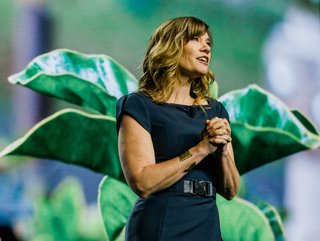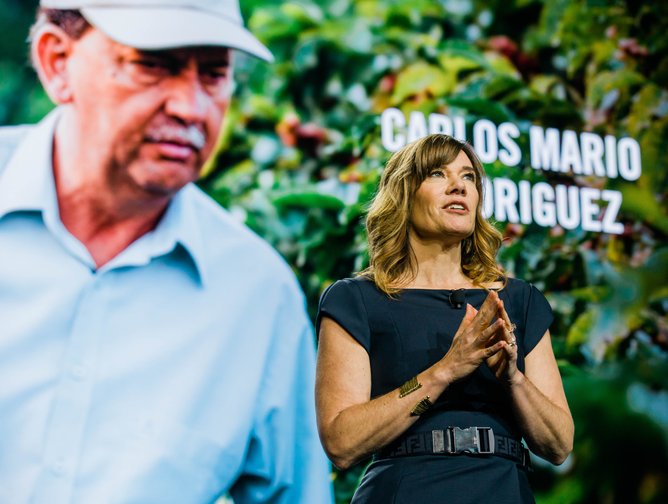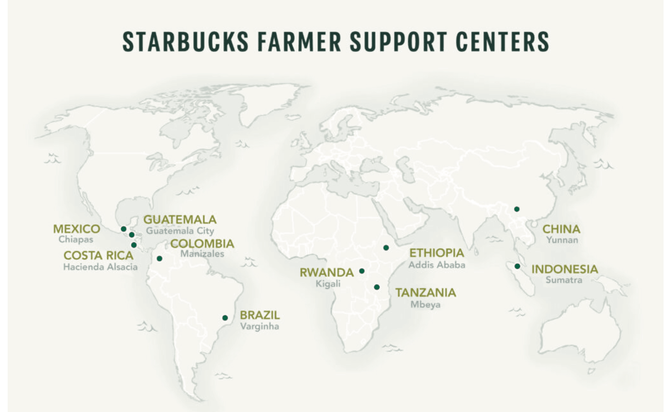Starbucks: The Journey to Carbon-Neutral Green Coffee

While sipping your morning cup of joe, consider this.
Growing demand for coffee has led to a 50% increase in production over the last 30 years, according to the International Coffee Organisation.
Today, 3 billion cups of coffee are consumed worldwide each day and the annual revenue of the global coffee industry is estimated to exceed US$200 billion.
With consumption rising 2% to 2.5% annually, demand for coffee is expected to triple by 2050.
And while the economic impact of the coffee sector is impressive, the environmental impact is not.
From deforestation to non-ethical labour practices, coffee production is among the most environmentally and socially exploitative agricultural values chains.
But change is afoot.
Coffee companies are increasingly greening their coffee supply chains, as consumers demand greener coffee and government legislation towards sustainability rolls out.
Chief among these is the ground-breaking EU Deforestation regulation, which took effect last June giving large companies 18 months for implementation.
Designed to prevent the import of products linked to deforestation and human rights abuses, the law’s ban on commodities produced on newly deforested land, including coffee, will force companies to trace their supplies back to a plot of land and submit the proof.
Starbucks Ensuring Sustainable Future For All
As the world’s largest coffee chain, Starbucks is committed to ensuring a sustainable future of coffee for all.
More specifically, Starbucks is focusing on reducing its carbon and water footprints, starting on the farms, and reducing greenhouse gas emissions by equipping farmers with precision agronomy tools, promoting, and distributing climate-resistant tree varietals and protecting and restoring at-risk forests in key coffee landscapes.
Given the Seattle-based business works with 400,000 farmers and procures around 800 million pounds of coffee each year – 5% of the world’s coffee – the “potential to positively impact the lives and livelihoods of farmers and their communities is tremendous”, says Michelle Burns, EVP of Global Coffee, Social Impact & Sustainability at Starbucks.
From protecting and restoring forests to ensuring the future livelihoods of farmers, the Seattle-based business is making good on its commitments – to achieve carbon-neutral green coffee and conserve water usage in green coffee processing by 50%, both by 2030.
Declaring the targets as “bold” and “ambitiously out there”, Michelle acknowledges that, while Starbucks doesn’t yet have all the answers, it is trying to find the solutions.

Delivering innovative and industry-leading solutions around sustainability is nothing new for the 50-year-old company – and especially when it comes to facilitating farmers.
Twenty years ago, Starbucks developed one of the coffee industry’s first ethical sourcing standards – Coffee and Farmer Equity Practices.
This verification programme allows Starbucks to ensure it gets high-quality, ethically sourced coffee while also gaining insights into the challenges faced by farmers and supply chain operations in the more than 30 different coffee-producing countries around the world – and then to share that knowledge back.
Measuring more than 200 criteria, in categories including economic transparency, environmental leadership, social responsibility and quality, Starbucks pays premiums above commercial market price to help ensure farmer profitability – and further financially rewards supply chains that reach the highest performance levels.
That same year, the coffee giant opened its first farmer support centre, in San Jose, Costa Rica – and since then, has rolled out a total of 10 support centres in coffee-producing countries around the world, providing more than 200,000 farmers with access to education, resources and the latest findings, from advanced soil management techniques to disease-resistant trees.

Among these, the Seattle-based company bought and renovated Hacienda Alsacia in Costa Rica – the company’s one and only farm that’s become its global research, development and innovation hub.
Here, agronomists have developed six climate-resistant coffee varietals that combine good yield and great taste, which Starbucks offers for free to farmers around the world through its open-source agronomy initiative.
Since making the commitment to distribute 100 million coffee trees by 2025, Starbucks has now distributed more than 80 million of the next generation of climate-resistant coffee trees in El Salvador, Guatemala and Mexico, according to Starbucks’ just-released Global Impact Report.
While in Colombia, more than 53 million coffee seedlings have been provided to farmers.
“People have watched us working hard to do the right things, find solutions and take great care of farmers and their communities, for decades,” says Michelle.
“They grant us an amount of trust and opportunity to help lead the discussion around ensuring a sustainable future of coffee for all. That is a privilege as well as a responsibility, but it's so important that we follow through.”
Among other initiatives designed to positively impact the lives of farmers, and support the next generation, the Starbucks Colombia Initiative, Granos de Experanza (Grains of Hope) is a real-time agricultural and economic lab.
Today, 100 local farmers in Narino, Colombia, are learning the latest climate education, soil and fertiliser analysis techniques and coffee cultivation and business practices. They are applying innovations gained at Hacinda Alsacia and incorporating new technologies like eco-pulpers that uses less water in the coffee-production process.
New technologies are also being used as part of the company’s goal to conserve water usage in green coffee processing by 50% by 2030.
The company is investing in eco wet mills that can save up to 80% of water in coffee processing, with 1,300 new mills installed around the world, as of the latest impact report.
With 200,00 wet mills currently in the Starbucks supply chain, the potential is huge for scaling this technology.
“I am seeing the possibilities, and I get excited about the overall positive impact we can have,” Michelle shares.
Committed to becoming resource positive, giving more than they take from the planet, Starbucks continues with efforts to protect and restore forests impacted by land-use change and deforestation.
The company also announced it is conducting a material biodiversity impact assessment with respect to its coffee supply chain, to be completed by the end of FY25.
Read Starbucks’ latest Global Impact Report.
**************
Make sure you check out the latest edition of Sustainability Magazineand also sign up to our global conference series - Sustainability LIVE 2024
**************
Sustainability Magazine is a BizClik brand
- ‘Client Zero’ IBM’s Guide to Using AI for SustainabilitySustainability
- Could AI and Data Help Nestlé Make Coffee Climate Resilient?Sustainability
- Businesses are Getting Sustainability Dangerously WrongSustainability
- Why EY is Warning US & Americas Companies on SustainabilitySustainability






